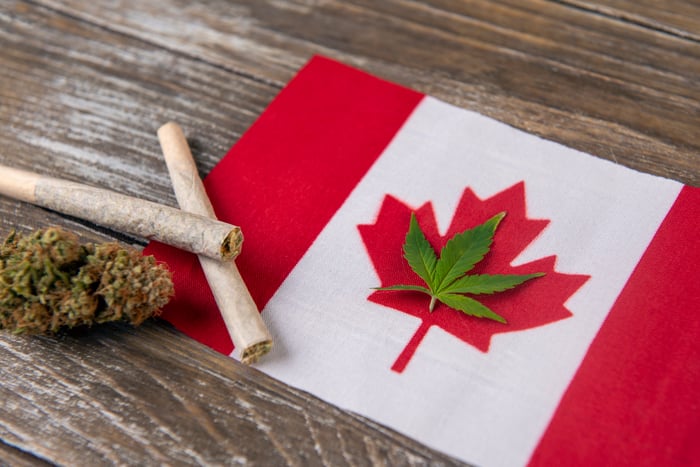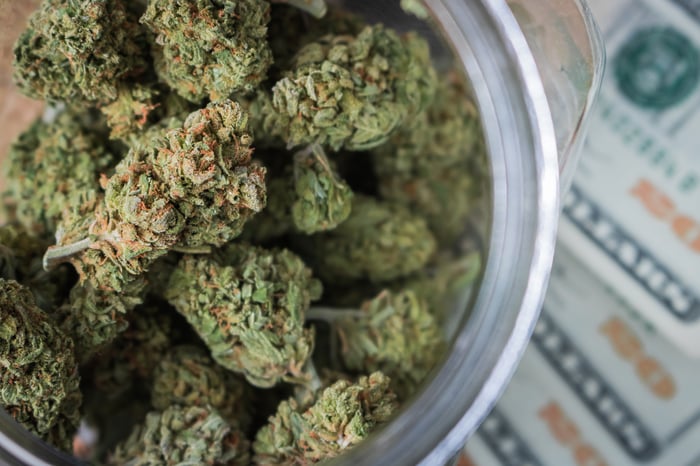The cannabis industry could very well be this generation's greatest growth story. With virtually every Wall Street projection calling for a double-digit percentage compound annual growth rate over the next decade, lofty pot stock valuations could soon prove inexpensive if legalizations and organic growth continue.
But we've also learned that the maturation of the marijuana industry won't be without its bumps in the road. Having already witnessed scandals rock Namaste Technologies and Aphria (APHA), Ontario-based CannTrust Holdings (CNTTQ) joined the dubious list earlier this week.

Image source: Getty Images.
CannTrust spills the beans on its blatant noncompliance
Prior to the opening bell on Monday, July 8, CannTrust announced that its flagship Niagara greenhouse (located in Pelham, Ontario), which specializes in hydroponic production, was found to be noncompliant by Health Canada, the regulatory agency that oversees the marijuana industry. More specifically, CannTrust admitted that it was growing (and selling) cannabis out of five rooms between October 2018 and March 2019 that were, at the time, unlicensed. These five cultivation rooms received their proper licensing from Health Canada in April.
As a result of these findings -- and CannTrust's admission of wrongdoing -- Health Canada has placed a hold on 5,200 kilos of dried cannabis that was harvested at the Niagara facility until such time as it deems that CannTrust is compliant with Canadian cannabis regulations. The company has also instituted a voluntary hold on 7,500 kilos of cannabis-equivalent production (i.e., this may include oils or other derivatives that were derived from these unlicensed rooms) being held at its much smaller Vaughan facility.
The press release does note that both the Vaughan and Niagara facilities remain fully licensed, and that CannTrust continues to grow, harvest, and sell cannabis from both campuses. Health Canada is, however, conducting quality checks on the currently held cannabis from Niagara, with the results expected back in 10 to 12 business days (July 22 to July 24).
Shares of CannTrust rightly fell 22% on the day of the announcement.

Image source: Getty Images.
Five thoughts from a CannTrust shareholder
As a current shareholder in CannTrust, I freely admit that this was unexpected, and that it's certainly no fun being caught up in a company that admits to skirting industry regulations. Here are five of my thoughts as a shareholder now that I've had time to digest this announcement.
1. Peter Aceto has to go
I don't come to this decision lightly, but CEO Peter Aceto has to be shown the door and new leadership sought out. Said Aceto in the press release:
Our team has focused on building a culture of transparency, trust and excellence in every aspect of our business, including our interactions with the regulator. We have made many changes to make this right with Health Canada. We made errors in judgement, but the lessons we have learned here will serve us well moving forward.
His admission of "errors in judgement" suggests that he knew the company was subverting Canadian cannabis regulations. Further, the company's admission of noncompliance demonstrates a lack of transparency and trust. With both Namaste and Aphria parting with their CEOs following their respective scandals, it seems logical that CannTrust will part ways with Aceto in due time.

Image source: Getty Images.
2. Margins are going to deteriorate in the near term
Prior to this announcement, CannTrust was already dealing with rising expenditures tied to expanding Niagara, and purchasing/leasing land in an attempt to get a large outdoor grow operation off the ground. In other words, its margins weren't exactly heading in the right direction, at least in the short term.
With the announcement that 5,200 kilos of inventory is being held by Health Canada, and that another 7,500 kilo-equivalents is being held back at Vaughan, the press release notes that certain customers (likely to include Canadian provinces) could face temporary supply shortages. This is pretty much code for "we're going to buy wholesale cannabis to make up for the shortage." Tilray has been buying wholesale pot to make up for its own growing shortages, and that's been wreaking havoc on its margins. I believe much of the same could be expected for CannTrust throughout the remainder of 2019.
3. This isn't a substantive amount of production in question
While no amount of noncompliance is acceptable, investors should also understand that this is a small percentage of CannTrust's production potential on a grander scale. When fully operational, CannTrust should be generating around 100,000 kilos a year, combined, from Vaughan and Niagara, with an additional 100,000 kilos to 200,000 kilos a year from its outdoor grow operations. Some of this outdoor grow should wind up in licensed dispensaries, but much of it will be used for extraction purposes to create derivative products.
In total, the 12,700 kilos of kilo-equivalent production set aside right now only seems like a lot of cannabis because no growers are anywhere near full capacity. A year from now, it'll be a relatively small percentage of total annual output.

Image source: Getty Images.
4. I'm waiting for the gavel to drop before I make a move
Although CannTrust shares have declined from where I initially purchased them in early May, I'm not inclined to buy more just yet.
I do believe the company offers plenty of value given its sheer production potential, focus on derivatives, supply agreements in Canada, and recent announcement of a push into the U.S. cannabidiol market. But I don't yet know what sort of punishment could be levied by regulators for the company's blatant disregard for licensing regulations. My personal guess is that CannTrust will face a fine, be granted back its held cannabis, and then expect extra inspections from Health Canada moving forward. However, it could take weeks before we get any sort of clarity on this situation.
5. Don't be surprised if a low-ball offer emerges
Last, but not least, don't be shocked if another marijuana stock swoops in with a low-ball offer to acquire CannTrust.
For those who may not recall, Green Growth Brands (GGBXF) aimed to capitalize on Aphria's misfortune with an all-stock hostile bid near the beginning of the year. In the three-month period between early September and the beginning of December, Aphria wound up losing about two-thirds of its value, which was culminated in a short-seller report that alleged the company had overpaid for its Latin American assets. As Canada's projected third-largest grower, Green Growth Brands attempted to swoop in and gobble up a beaten-down Aphria at a bargain price. Eventually, Green Growth's bid was turned down.
It won't be surprising if a low-ball offer emerges for CannTrust, depending on the outcome of Health Canada's findings.





